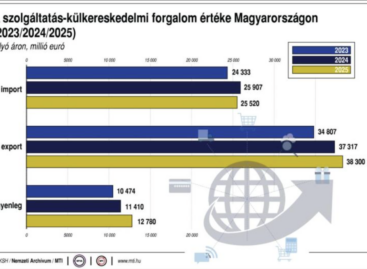Hungary’s economic vulnerability: causes, consequences and possible solutions
The economic developments of recent years have once again drawn attention to the vulnerability of the Hungarian economy. The declining growth, the fluctuating forint exchange rate and the runaway inflation have caused problems that are not only noticeable at the level of numbers, but also in everyday life. What are the main problems and how can they be remedied?
Among the warlords of Europe
 While most EU countries were able to grow, Hungary’s economy shrank in two years, the only one in the region. In parallel, the transport infrastructure is deteriorating, the state healthcare is being dismantled, and consumption is also lagging behind the EU average. The forint exchange rate has fallen several times, currently hovering around 410 forints against the euro – losing more than 12% of its value in five years.
While most EU countries were able to grow, Hungary’s economy shrank in two years, the only one in the region. In parallel, the transport infrastructure is deteriorating, the state healthcare is being dismantled, and consumption is also lagging behind the EU average. The forint exchange rate has fallen several times, currently hovering around 410 forints against the euro – losing more than 12% of its value in five years.
We are inflation record holders
In the first months of 2025, Hungary had the highest inflation in the EU, exceeding twice the EU average. Compared to 2019 levels, prices have increased by more than 50%, while in the eurozone it has only increased by 20%. This is costly for all economic actors, especially given the unpredictable economic environment.
Why is the Hungarian economy so vulnerable?
The reasons include:
- The forint as a target for speculation: The domestic currency is liquid and unregulated, making it an easy target on international financial markets.
- Unpredictable fiscal policy: The government deficit is persistently high, especially in election years, which weakens economic stability.
- Disproportionate tax system: Excessive consumption tax burdens and low income and wealth taxation make the budget vulnerable during recessions.
- Fluctuating income policy: Public sector and minimum wage increases are often campaign-like, unpredictable, and disruptive to economic actors.
- Excessive industrial concentration: The economy is increasingly dependent on car and battery manufacturing, which increases cyclical risks.
High energy dependence: The high proportion of imported energy makes the country vulnerable to geopolitical and market fluctuations.
Related news
KSH: The foreign trade surplus in services was 3.1 billion euros in the fourth quarter of last year
🎧 Hallgasd a cikket: Lejátszás Szünet Folytatás Leállítás Nyelv: Auto…
Read more >Related news
SPAR is preparing for an Easter rush: it is filling its stores with 570 tons of smoked meat products
🎧 Hallgasd a cikket: Lejátszás Szünet Folytatás Leállítás Nyelv: Auto…
Read more >Focus on the domestic fishing sector at SIRHA Budapest
🎧 Hallgasd a cikket: Lejátszás Szünet Folytatás Leállítás Nyelv: Auto…
Read more >








